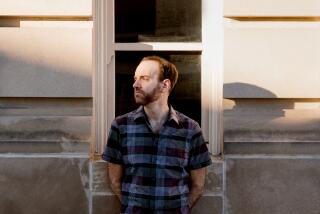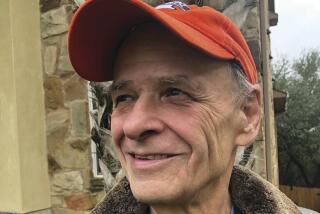Nicola Griffith discusses ‘Hild,’ the girl who would be saint
Author Nicola Griffith is as unpredictable and fascinating as one of her heroines. Her first two novels, “Ammonite” and “Slow River” (which won a Nebula Award), were science fiction. And from 1998 to 2007, she followed up with three novels of suspense centered on a tough, wealthy ex-cop named Aud Torvingen. She also published a Lambda Award-winning memoir, “And Now We Are Going to Have a Party: Liner Notes to a Writer’s Early Life,” about her upbringing in Yorkshire, England, and a life riotously lived (her immigration case landed her on the front page of the Wall Street Journal after the State Department made a rule that allowed her to stay in the U.S. because it was “in the national interest”).
Not surprisingly, Griffith’s latest novel, “Hild” (Farrar, Straus & Giroux: 560 pp., $27), is an even more radical departure from her previous work — an epic historical novel set in the 7th century about the real-life woman who would become Saint Hilda, one of the most influential figures of the age. We caught up by phone with Griffith at home in Seattle to discuss “Hild.”
What led you to Saint Hilda, who we have only a five-page biographical sketch about from the Venerable Bede?
Oh, I wish there was as much as a biographical sketch! Bede was a monk writing not only 50 years after Hild’s death but with an agenda. His book is “The History of the English Church and People.” Church first. He ignores things that don’t fit his worldview: Apparently that is most of Hild’s life. So we meet her in the womb (when her mother is dreaming her unborn child will be the light of the world), briefly when she’s baptized at age 13, and then not until she’s 33 and being recruited to run an abbey. We don’t know if she was married or had children, what she looked like or anything of her talents or temperament.
We do know that Hild must have been extraordinary. ... If we go by the extant poetry, it was a heroic culture, wholly oral, steeped in gold and glory and gore. Hild began as the second daughter of a homeless widow, almost certainly illiterate. Yet she rose to become an advisor to kings and founder of Whitby Abbey. How did she do that? I wrote the book to find out.
You start with Hild at age 3 and we follow her to early adulthood. How scary was it when you sat down to begin?
I was frankly terrified. I wanted to write a novel set in the 7th century — about which most readers know nothing. I wanted to write a novel of character on an epic canvas. I wanted to write something so immersive that the reader would live Hild’s life alongside her. ... Hild had to be in every scene — no relying on “Meanwhile, back in the point-of-view of a character you’d forgotten existed...” But how do you write an epic from one point of view? And at the same time how do you create a world that won’t feel too alien to most readers? The thing was impossible!
The only way to be a novelist, to think that you can create something others will give themselves up to for a dozen hours or more, is to have psychotic self-belief.
You’ve talked about the lack of primary sources about Hild herself necessitating somewhat of an ‘outside in’ approach: you learned her world and conjured her inside it. Was that freeing? How well do you feel like you know her at this point?
Setting is my primary joy as a writer, building a world and watching people respond to it. What a character like Hild notices around her can tell the reader who she is, how she feels, what kind of trouble she’s in. It’s fascinating. All kinds of unexpected things happen. The world mutates before your eyes. Add to that the sheer delight of infusing the reader with the wild magic of landscape, the order and wonder of nature, and it’s thrilling.
I know Hild for the years I’ve written about. I know exactly how she would behave as a ten year-old, or teenager, or woman coming into a sense of her own power. Who she is as a mature woman, as an old woman, that I’m not sure of yet.
What was it like to work within the constraints of the gender conventions of the time?
Apart from the epic novel of character conundrum, my biggest challenge was gender. Not how it actually was, but how we’re conditioned to think of how it was. Women of the past, we’re told, were objects not subjects, they had no agency, they were submissive. What a load of rubbish. Women are people — as human then as you and I are today. People find ways around their constraints, whether it’s gender, status, physical ability, and so on. What counts is how you use what you’ve got. Hild has a singular mind.
Despite that singularity, though, despite her elite status, in terms of class and ethnicity, she still has to operate within certain constraints. So, for example, as a woman she can’t use a sword; she has to find another way to lead in a warrior culture. No reader so far has raised their eyebrows at my solution. Perhaps they’re too confounded by her sexuality.
Since long before the seemingly constant debate began about whether the internet and social media are a blessing or a curse for authors, you’ve maintained a lively online presence. How has that willingness to share impacted your relationship with readers?
My first website went up in 1995. On it I ran a feature called Ask Nicola. Readers would email me questions, I’d answer whichever took my fancy. I still do that, though now on a blog. Now, too, there’s Twitter and Facebook and a dozen others.... For a while I blogged daily, but eventually that became a burden. Now I post what I want when I want.
I’ve met some incredible people this way, several of whom are now close friends—really, the kind you invite to your wedding or cook for when they’re miserable, who send me presents they think I might find intriguing. There’s a vast pool of goodwill out there now, from me to others and vice versa, a web of generosity that sees us all through life’s big moments and dailyness.
Will we be seeing more of Hild [in a sequel]?
Oh, there’s more. I’ll be living in the 7th century for a while. I’m fascinated by Hild, what happens next, and how she responds. Plus, I’m working at my absolute limit. I love it.
Bond’s most recent novel is “The Woken Gods.”
More to Read
Sign up for our Book Club newsletter
Get the latest news, events and more from the Los Angeles Times Book Club, and help us get L.A. reading and talking.
You may occasionally receive promotional content from the Los Angeles Times.









